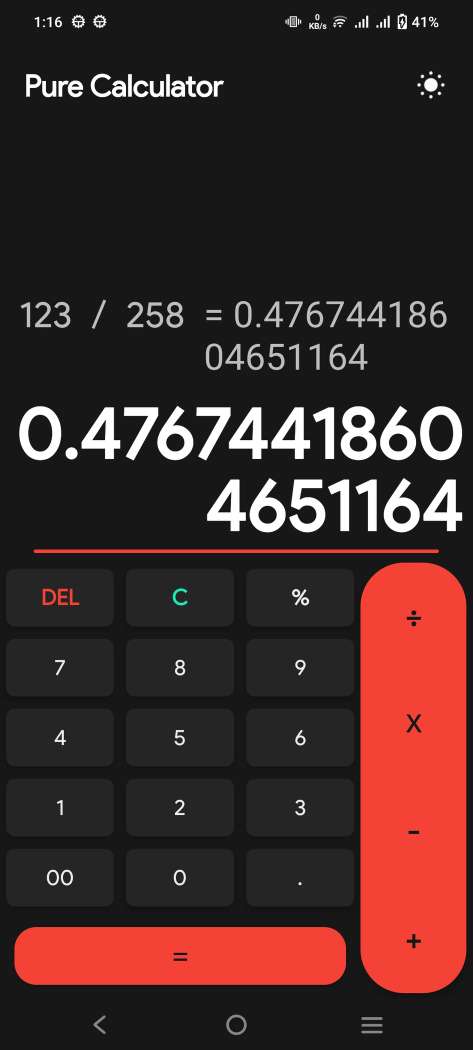In the realm of pure mathematics, the calculator emerges as both a tool and a source of contention. One might ponder: how often is a calculator employed in the rigorous discipline of pure mathematics? This inquiry invites us to traverse the landscape of mathematical practice where abstraction, deductive reasoning, and conceptual frameworks reign supreme.
To commence, it is vital to delineate what pure mathematics entails. Differing from applied mathematics, which encompasses practical applications in the natural and social sciences, pure mathematics focuses on theoretical constructs. It examines the intrinsic qualities of mathematical entities—numbers, patterns, structures, and relationships—often without immediate regard for external applications. With this backdrop, one can better appreciate the role calculators play within this disciplined art.
One may be surprised to discover that calculators, particularly in advanced realms of pure mathematics, tend to occupy a paradoxical space. In introductory courses, particularly those involving arithmetic or algebra, calculators may serve as supportive tools, aiding students in computations that might otherwise be tedious. Yet, as one delves deeper into subjects such as topology, abstract algebra, or number theory, the reliance on calculators diminishes. Why might this be the case?
The absence of calculators in advanced mathematical courses can be attributed to several pedantic notions. The first concerns the nature of pure mathematical inquiry, which frequently emphasizes proofs rather than computation. Engaging in proof-based mathematics not only cultivates logical reasoning but also enhances one’s understanding of foundational principles. The depth of exploration required in demonstrating mathematical truths often supersedes the need for numerical evaluation, rendering calculators superfluous.
Moreover, mathematicians delight in the elegance of abstraction. Pure mathematics is characterized by its love affair with symbols and theoretical constructs. Therefore, employing a calculator might seem almost antithetical to the ethos of the discipline. The intricacies of proofs, the interplay of functions, and the exploration of complex spaces involve articulating ideas that calculators cannot encapsulate. This dimension of mathematical exploration emphasizes understanding over calculation.
One could contend, however, that calculators, particularly computational software, yield substantial utility when tackling complex problems that extend beyond mere arithmetic manipulation. The advent of sophisticated tools such as Mathematica and MATLAB suggests a reimagining of the calculator’s role. In pure research, mathematicians encounter arrays of data, simulations, and computational models, where the use of technology becomes indispensable. This intersection of theoretical mathematics and computational prowess invites an intriguing consideration: does the integration of such technology detract from traditional mathematical rigor, or does it enhance our understanding?
In addition, one must consider the pedagogical implications of calculator use in mathematics education. In introductory courses, reliance on calculators can foster complacency, cultivating a mindset that favors computational shortcuts over deep cognitive engagement with mathematical concepts. Conversely, it is essential to recognize that calculators can facilitate learning by providing immediate feedback and allowing students to explore mathematical ideas dynamically. The challenge then lies in striking a balance: fostering computational fluency while simultaneously nurturing a robust understanding of theoretical principles.
Despite the evident advantages within a structured learning environment, the prevailing sentiment among purist mathematicians tends to eschew reliance on calculators. Is this a relic of traditionalism, or does it reflect a profound respect for the complexity of mathematical thought? Consider the mathematician grappling with proofs in number theory—applying complex theorems requires an unyielding familiarity with underlying concepts rather than mere computation. Herein lies a key philosophical question: should mathematicians relinquish their calculators entirely in pursuit of intellectual rigor?
Indeed, the discourse on calculator usage in pure mathematics necessitates an exploration of attitudes within the mathematics community. Many mathematicians assert that the human mind remains superior to mechanical computation, especially when unraveling abstract ideas. The intuitive capacity for pattern recognition and the ability to conjoin disparate concepts underpins the true essence of pure mathematics, which calculators cannot replicate. Hence, one observes this cognitive dimension significantly altering the frequency of calculator usage in advanced mathematical settings.
Furthermore, specialized areas within pure mathematics exhibit a distinctly varied relationship with calculators. For instance, in the realm of combinatorics or graph theory, expansive data sets and complex arrangements may indeed require algorithmic assistance. Yet, rather than relying on calculators for rote computations, the focus shifts toward leveraging technology to explore combinatorial identities or visualize intricate relationships. This nuanced perspective imbues the use of calculators with purpose while maintaining fidelity to the foundational insights of pure mathematics.
In conclusion, the frequency with which a calculator is utilized in pure mathematics oscillates between the empirical and the theoretical. While calculators serve as valuable instruments in introductory contexts, their usage diminishes significantly as one ventures into advanced mathematical domains. The ultimate challenge represents a delicate balance; educators and practitioners alike must navigate the intersection of computational facilitation and theoretical integrity. As mathematical inquiry continues to evolve, the dialogue surrounding the role of calculators remains pertinent, prompting mathematicians to reflect upon the implications of mechanics in an inherently abstract discipline. Ultimately, one must endeavor to appreciate the sublime beauty of mathematical thought, which, even in this age of incessant computation, flourishes within the mind’s intricate labyrinth.












